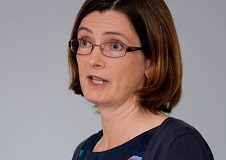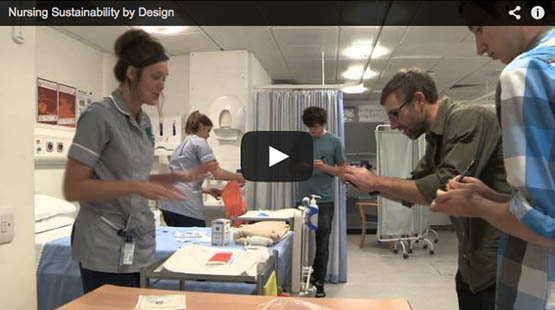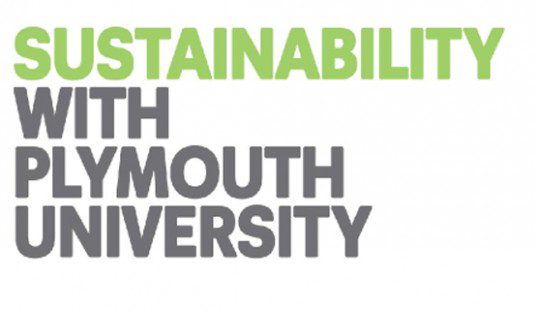
Professor Janet Richardson, Professor of Health Service, Research Faculty of Health and Human Sciences, Plymouth University
Introducing sustainability concepts to undergraduate nursing and healthcare students
At Plymouth University we wanted to embed sustainability in the nursing curriculum in a way that made it relevant to practice. Our project aimed to introduce sustainability concepts to undergraduate nursing and healthcare students, and to increase awareness and encourage discussion. We recognised that implementing sustainability practices in healthcare requires a multi-professional approach so we worked with our Design colleagues to involve Product Design students in learning opportunities.
So often issues about climate change and sustainability can seem rather theoretical and remote; often the problems feel so much bigger than any individual so we become paralysed and unable to act. In healthcare we have significant challenges that relate to how we manage resources and how we can ensure we have sustainable supply chains for the things we use every day. Changes in climate, natural disasters and geopolitical events can impact on the availability of healthcare resources and our ability to deliver healthcare. The course we have devised demonstrates this to students through identifying and discussing the sustainability issues which may directly affect them as health care practitioners.
We have used our research in health and sustainability to develop scenario-based sessions for nursing and healthcare students that link evidence to practice. Students engage fully in the sessions, and the involvement of design students adds a new dimension to discussions and possible solutions.
Following these scenario-based sessions the students are asked to complete an attitudes and knowledge questionnaire which have been used to evaluate both student learning and the value of the course. Our findings are summarised below:
Change in attitudes
There has been a demonstrable change in attitudes towards sustainability and climate change and including these topics in the curriculum where student nurses participate in these sessions. Comments suggest the sessions are interesting and relevant to practice:
Really has made me question what to throw away where, and not to use equipment that is not needed. Made me think what I can do to help a problem fast approaching of lack of materials (student nurse).
Change in knowledge
A comparison of student nurses found better knowledge of waste management in those who had participated in the sustainability skills session compared with students who did not participate.
Interdisciplinary learning
Students have benefited from interdisciplinary learning: This gave us a better understanding of the problem.
I can imagine this being a real life situation (Design Student)
This was thought provoking.
Liked the low-high impact workshop, made me think with in relation to practice (Student Nurse).
Sustainability products
Product Design students we were able to implement an ‘empathic design process’. This involved observation of users and user environments to stimulate insights; idea generation, development and prototyping in 3D; collaborative discussion with users to evaluate and then refine concept propositions.
Benefits
We have seen the benefits of academics from different disciplines working together. For example health academics have been learning about product development, Intellectual Property issues and Commercialisation
The team was shortlisted for a Plymouth University Vice-Chancellor’s Enterprise Award in recognition of the project in 2013, and we won the Green Gown Award 2014 for Courses and Learning.
We have been able to create further opportunities for students, such as via the development of a prototype e-version of the sustainability and healthcare scenario skills sessions. This will be developed by third year design students and tested by second and third year student nurses. The intention is to make this e-version more widely available to educators, nurses and other healthcare practitioners.
Resources
The course will undoubtedly provide inspiration to other Universities across the UK and internationally. It’s also wonderful that it’s stimulated further off-shoot projects. I think one big question other institutions will be asking is from a resource perspective who was involved and what were their roles?
Well, initially we had members of our Sustainability, Society and Health research group working with academic colleagues who teach the child health students. We very quickly involved colleagues in 3 D Design who teach product design; at Plymouth the design courses are underpinned by sustainable design principles. We now teach the sustainability scenarios to students across the nursing curriculum and run some sessions with other healthcare professional students.
Challenges
The initial challenge was to convince colleagues that sustainability is relevant to the nursing curriculum, and we achieved this by running the scenario with our academic colleagues. The challenge now is to continue to develop new scenarios that are contemporary and evidence-based. In terms of advice to others, I would encourage them to make sure that the sustainability scenarios they use are practical, relevant and evidence-based, and that they are designed to focus participants on discussion.
The susthingsout editorial team would like to thank Professor Janet Richardson for providing this article.
Further details about the project can be found at:
Sustainability, Society and Health Research
Or you can follow the project: twitter @SSHRPlymUni and @NurSus_EU
Professor Richardson’s work can be found in the following journals:
Richardson J., Grose J., Gill JL., Hertel J., Jackson B., Sadeghian H., Kelsey J. (2014). Effect of climate change and resource scarcity on health care. Nursing Standard 28(45):44-49 http://rcnpublishing.com/doi/pdfplus/10.7748/ns.28.45.44.e8415
Manzi, S., Nichols, A. & Richardson, J. (2014). A non-participant observational study of health and social care waste disposal behaviour in the South West of England. Journal of Health Services Research & Policy
http://hsr.sagepub.com/cgi/reprint/19/4/231.pdf?ijkey=9Sdr1IcgJtXQAaP&keytype=ref
Richardson J., Grose J., Doman M., Kelsey J. (2104) The use of evidence-informed sustainability scenarios in the nursing curriculum: development and evaluation of teaching methods. Nurse Education Today. 34:490-93
Grose J., Richardson J. (2013) Strategies to identify future shortages due to interruptions in the healthcare procurement supply chain: a method from the English National Health Service. Journal of Health Service Research Policy and Practice. http://hsr.sagepub.com/content/early/2013/08/21/1355819613502172


I really enjoyed my trip down to Plymouth last year to see this in action. I sat in with a group of students who were being lead through the scenario based session with Janet and it was like watching light bulbs being switched on as they made the connections between the big issues of sustainability and their everyday practice as future nurses. One student very quickly grasped that a better sorting of clinical and non-clinical waste to reduce the amount of waste requiring incineration would not only reduce the impact in terms of sustainability but could also save enough money to fund an additional nursing post in his placement hospital. Keep up the great work Janet and Jane and we’re really pleased to be associate partners of the project to develop and evalaute this innovative approach to learning about sustainability in the nursing curriculum.
I think its fantastic that Plymouth have managed to achieve the holy grail of embedding sustainability into the curriculum in subjects that go beyond the traditional ‘sustainability agenda’. On top of this, they have created an interdisciplinary strategy that builds upon skills of students of different disciplines to create real sustainability solutions. A great example of sustainability in practice!